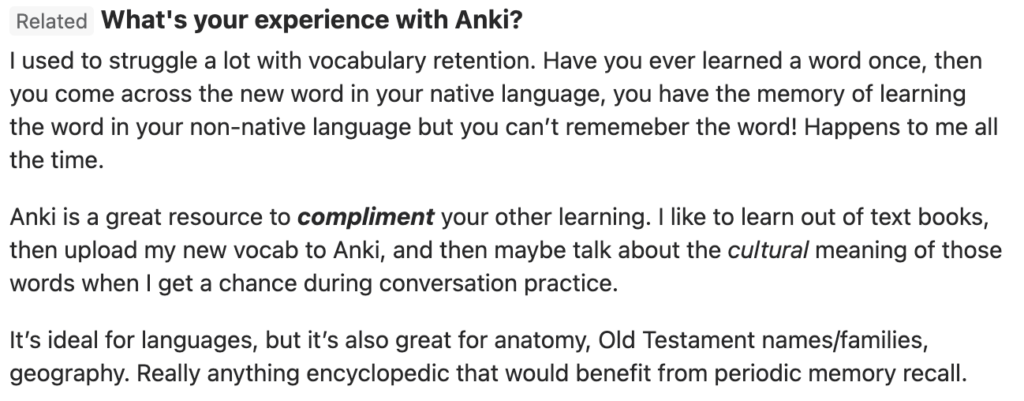Anki Review – How Helpful Is it?
How Anki Works
Anki’s Features
Benefits of Using Anki
Drawbacks of Using Anki
- ❌ Steep Learning Curve. Anki’s interface can be intimidating for beginners, and it takes time to learn how to create effective flashcards and navigate the program.
- ❌ Time-Consuming. Anki requires a significant time commitment, especially when you’re first starting out. Creating high-quality flashcards can be time-consuming, and daily review sessions can take up a considerable amount of time.
- ❌ Limited Subject Matter. While Anki can be used to study virtually any subject, it’s best suited for memorizing facts and information. It may not be the best tool for subjects that require deeper understanding and analysis. For comprehensive learning of new concepts rather than just memorisation, platforms like Khan Academy might be better suited – see this Khan Academy review for a deeper look at its teaching methodology.
- ❌ Monotonous. Some users may find the process of reviewing flashcards to be tedious and monotonous, leading to decreased motivation and engagement over time.
It’s important to weigh the benefits and drawbacks of Anki to determine whether it’s the right study tool for you.
Tips for Using Anki Effectively
Sure, using Anki can be an effective way to retain information for long periods of time, but it’s important to use it effectively in order to get the most out of it. Here are some tips to help you use Anki effectively and efficiently:
- ✏️ Create high-quality flashcards. The effectiveness of Anki largely depends on the quality of your flashcards. Make sure your cards are clear, concise, and well-formulated to ensure optimal retention and recall.
- ✏️ Use spaced repetition. Anki’s spaced repetition algorithm is designed to optimize retention by showing you cards at intervals that maximize your chances of remembering them. Make sure you take advantage of this feature by reviewing your cards regularly.
- ✏️ Prioritise active recall. Active recall, or the process of trying to remember information from memory, is a powerful tool for strengthening long-term memory. Make sure your flashcards are designed to encourage active recall rather than passive recognition.
- ✏️ Take advantage of multimedia. Anki supports a variety of multimedia formats, including images, audio, and video. Incorporating multimedia into your flashcards can make them more engaging and memorable.
- ✏️ Be consistent. Consistency is key when it comes to using Anki effectively. Make reviewing your cards a regular habit and stick to a schedule that works for you.
By following these tips, you can get the most out of Anki and optimize your learning and retention.
Is Anki Helpful for GCSE and A-level Students?
Anki can be a powerful tool for students at all levels, including those studying for GCSE and A-level exams. With the ability to create custom decks and study materials, students can tailor their use of Anki to their specific needs and subjects. For students considering other revision platforms, our GCSEPod review provides a detailed evaluation of another popular option that uses a different approach to learning.
Additionally, the spaced repetition algorithm used by Anki is based on scientific research into how the brain processes and retains information, making it a potentially valuable aid for students looking to improve their long-term retention of course materials.
However, it’s important to note that Anki should not be relied upon as the sole method of studying for exams. It should be used in conjunction with other study methods, such as reading textbooks, attending lectures, and completing practice problems. Additionally, students should be careful not to over-rely on Anki’s algorithm to determine their study schedule, and should make adjustments as needed to ensure they are adequately preparing for exams.
Here are some reviews for Anki:


Final Thoughts
In conclusion, Anki can be an extremely useful tool for students looking to improve their memory and retention of information. Its powerful algorithm, customisable options, and active community make it a top choice for many learners. However, it’s important to keep in mind that Anki is just one tool in the student’s toolkit, and it may not be suitable for everyone. Additionally, it’s essential to use Anki effectively by following the tips we outlined earlier and being mindful of its drawbacks.
At the same time, students who need additional help with their studying and revision should know that they don’t have to go it alone. Edumentors, an online tutoring company, offers personalised support to students at all levels. These experienced tutors can help you overcome your learning challenges and achieve your academic goals. So, if you need extra help with your studies, don’t hesitate to reach out to Edumentors.








